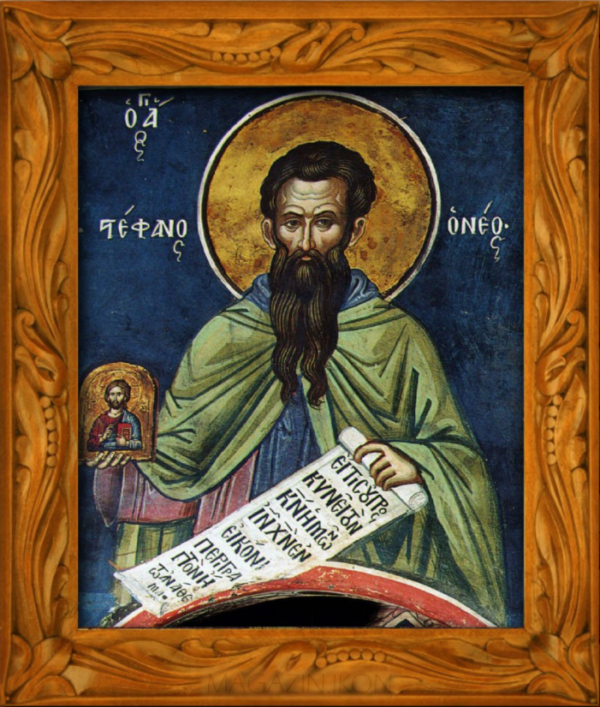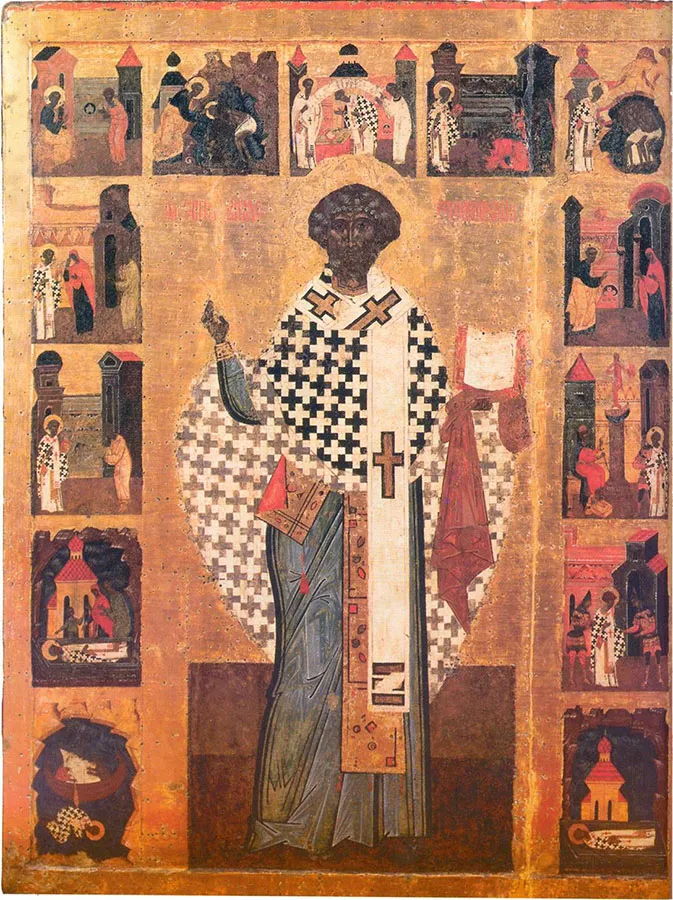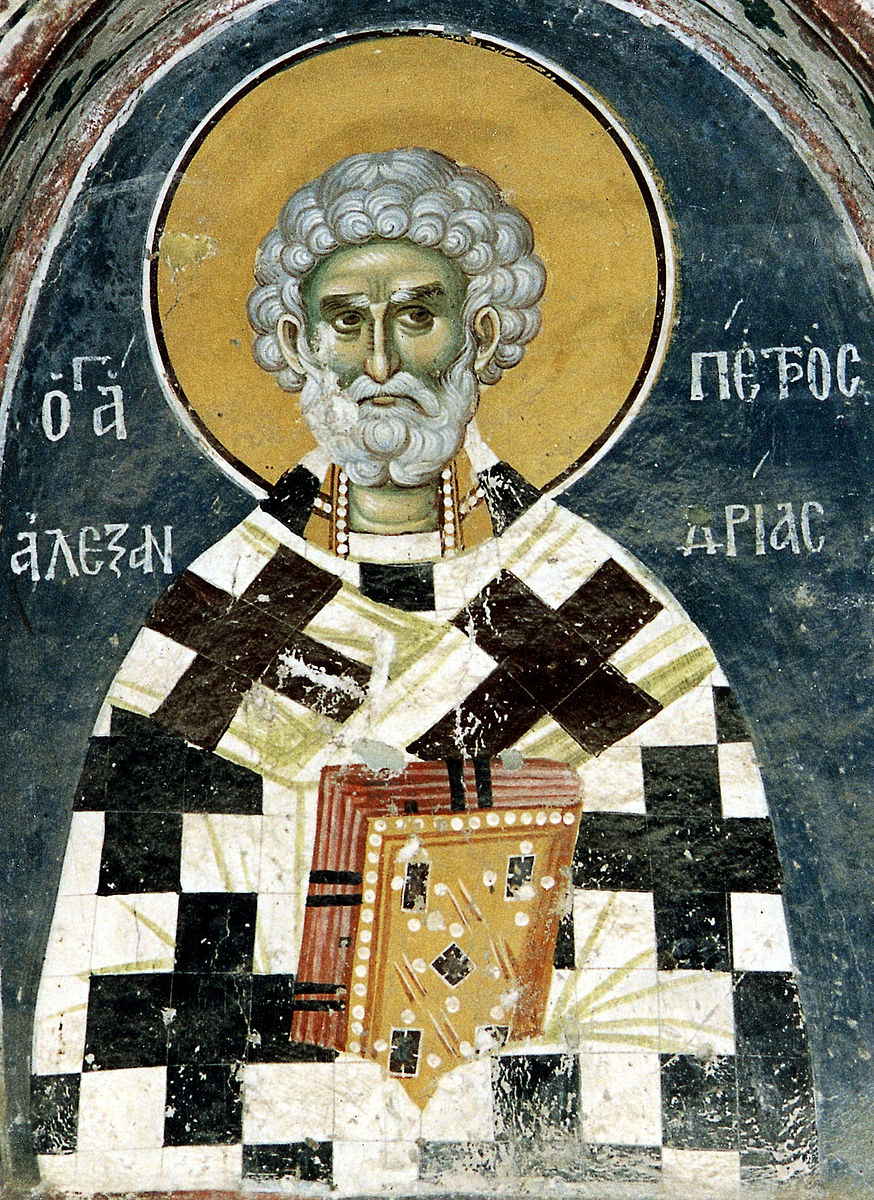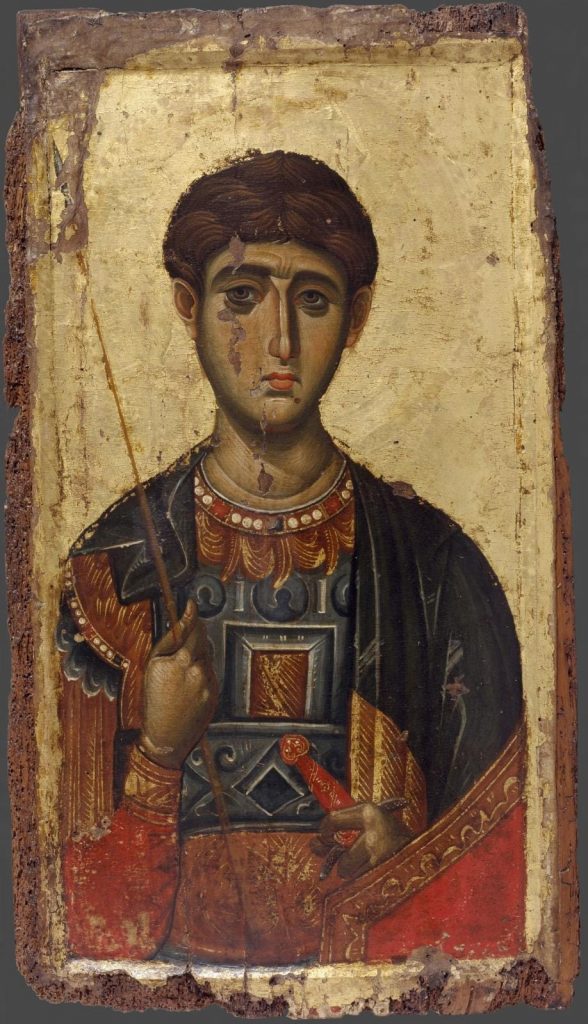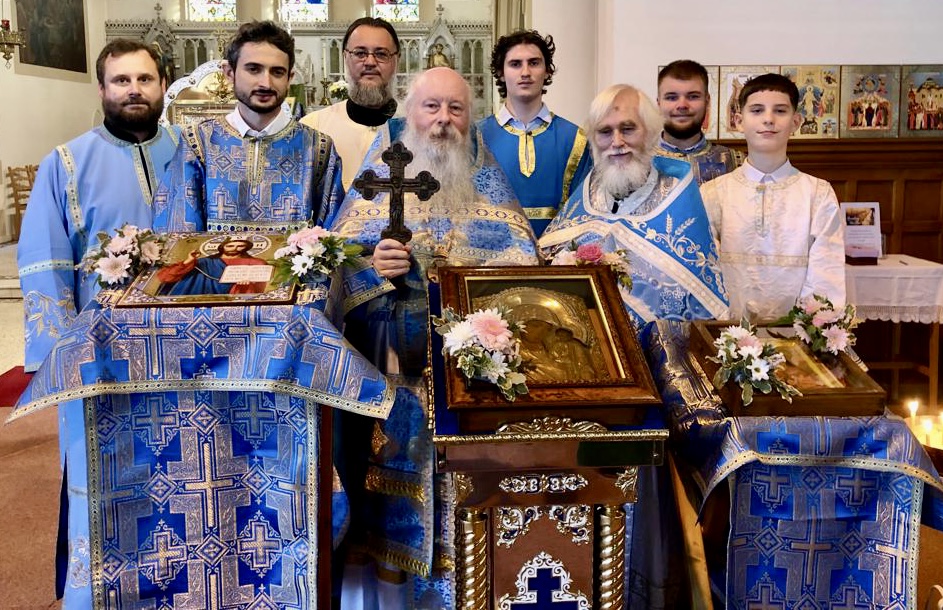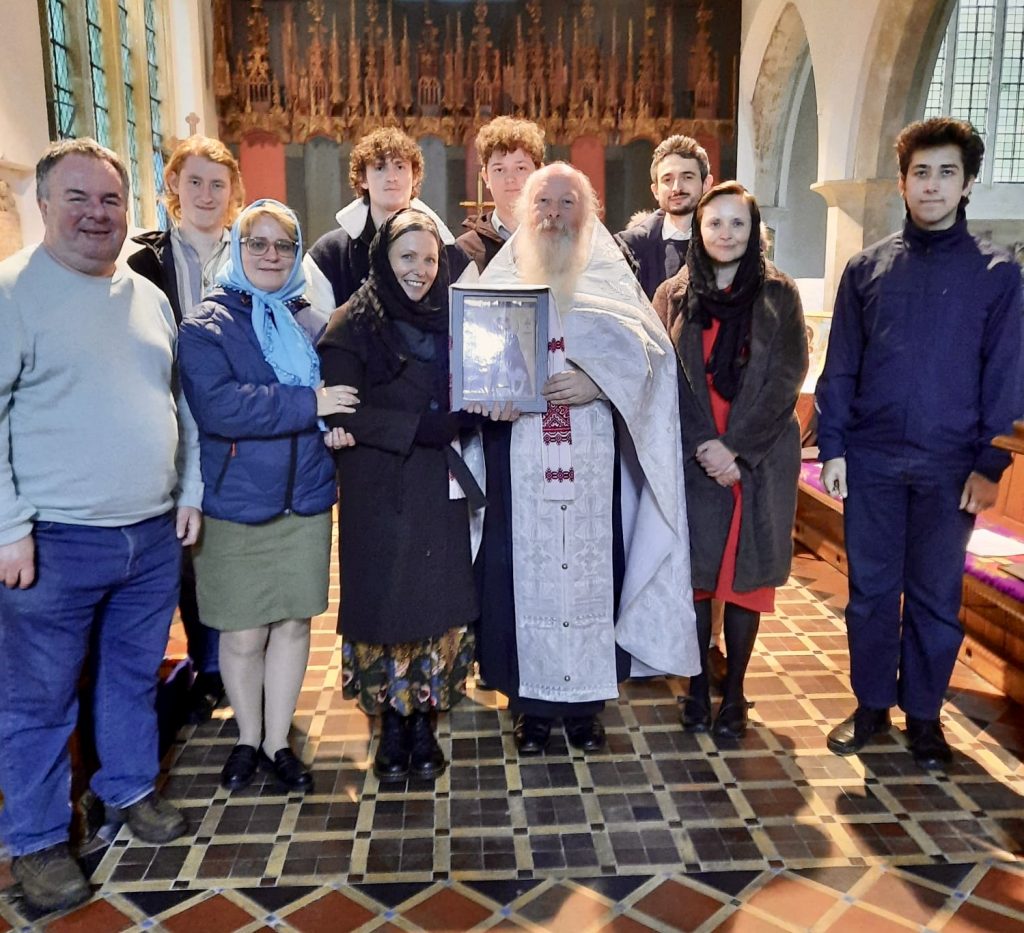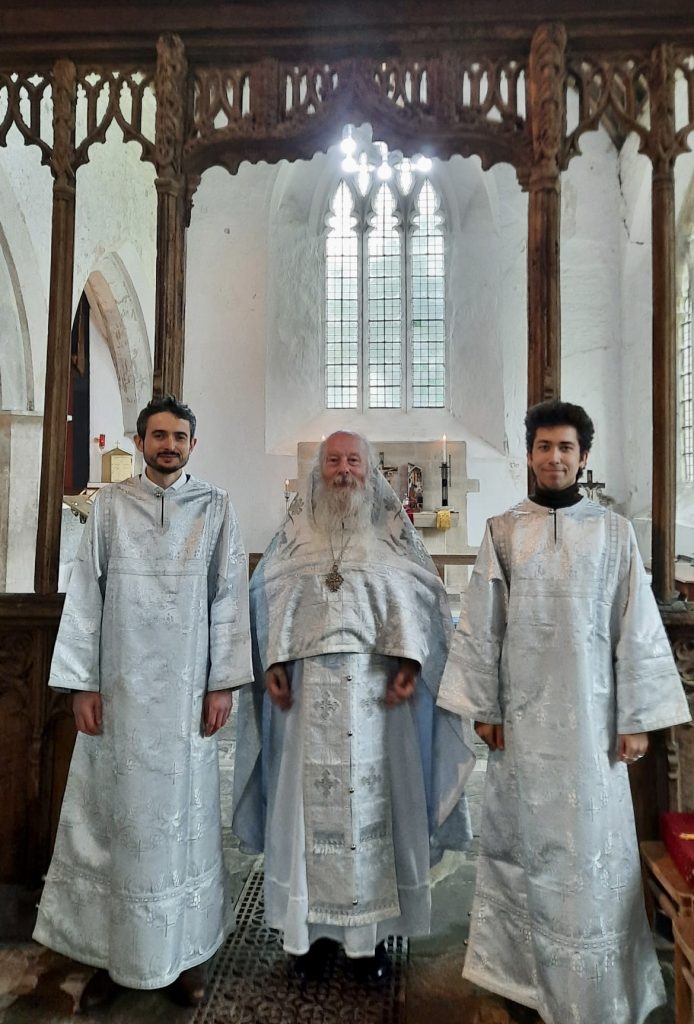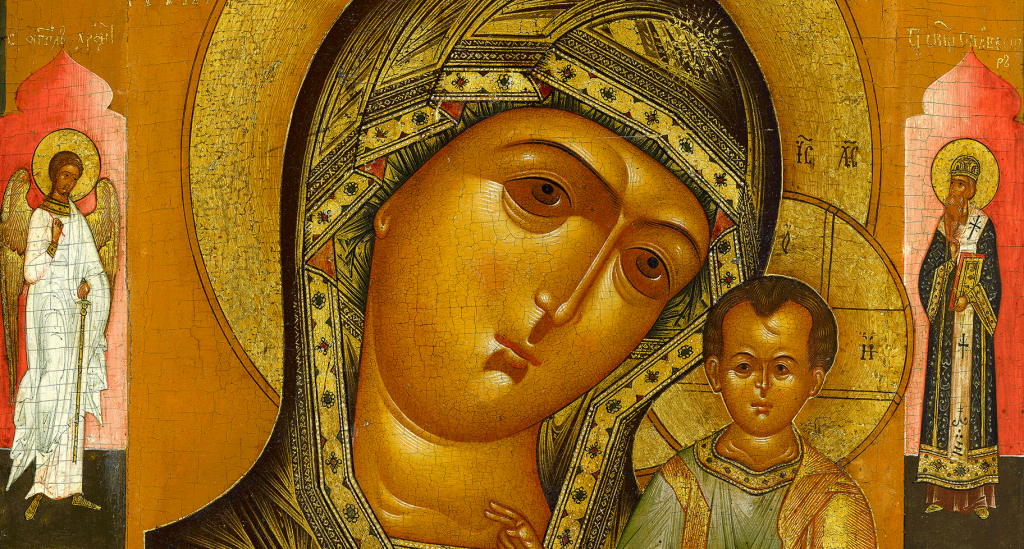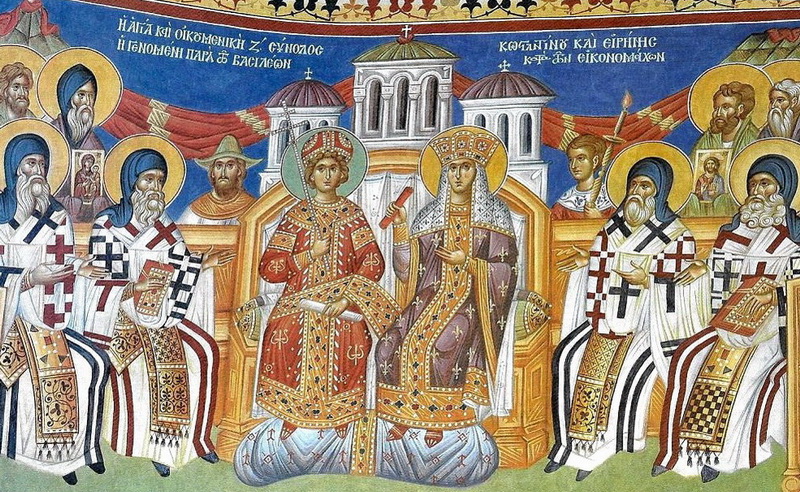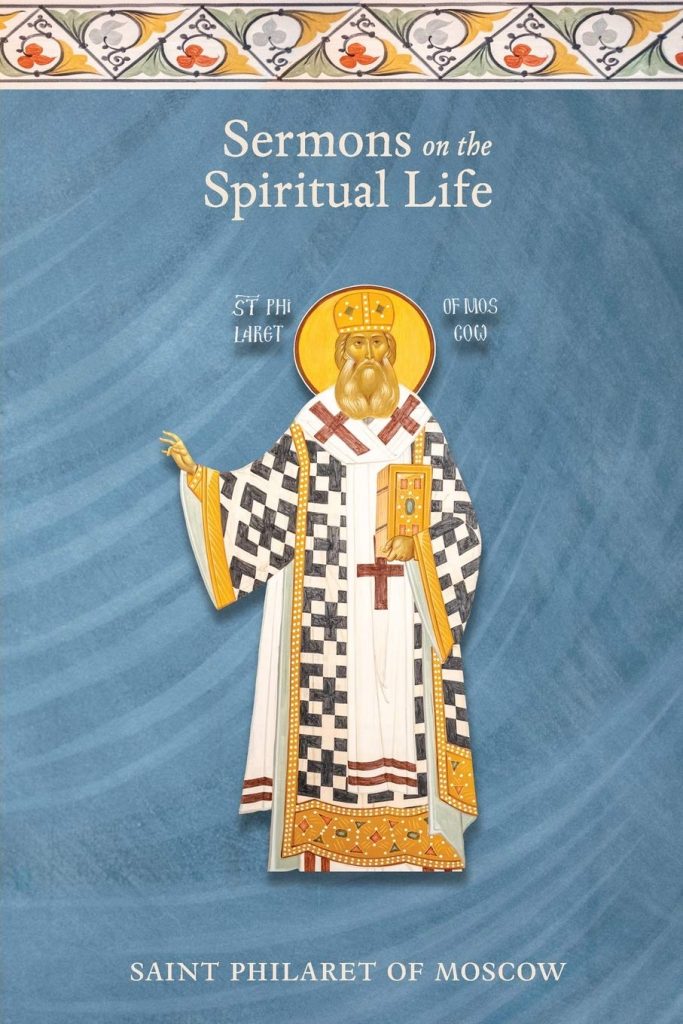Apologies that publish did not complete for this post yesterday.
1/14 December
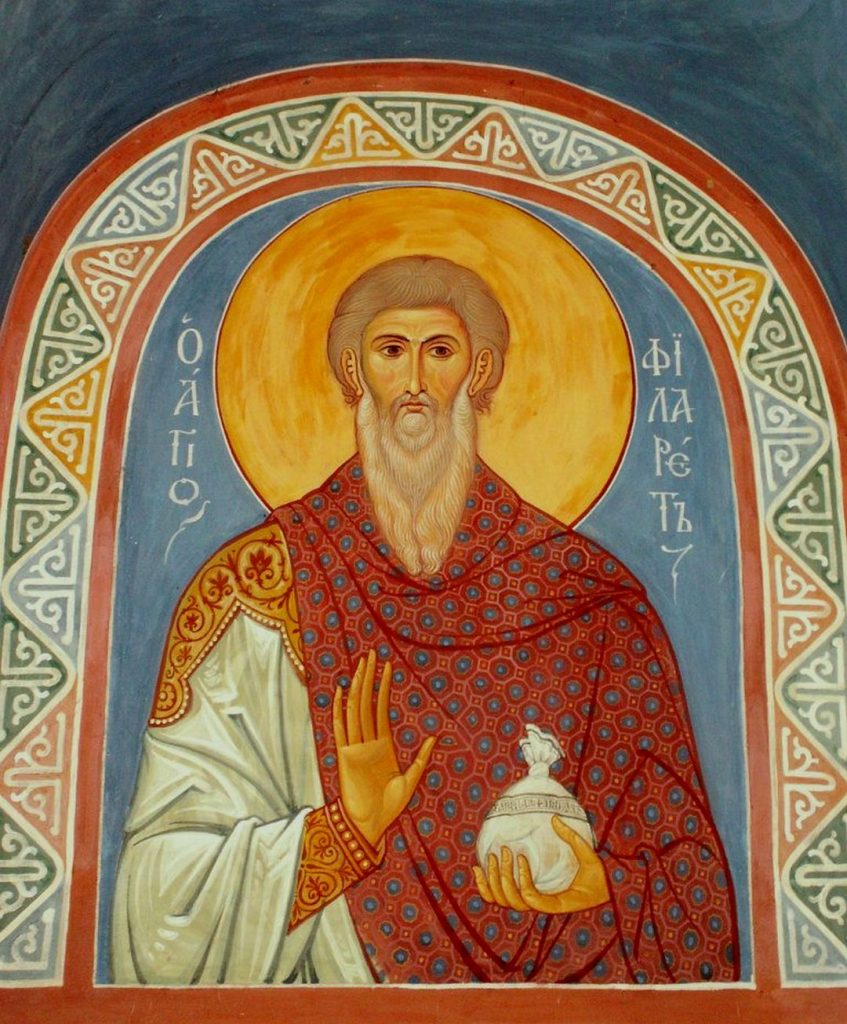
Righteous Philaret the Merciful, son of George and Anna, was raised in piety and the fear of God. He lived during the eighth century in the village of Amnia in the Paphlagonian district of Asia Minor. His wife, Theoseba, was from a rich and illustrious family, and they had three children: a son John, and daughters Hypatia and Philaret was a rich and illustrious dignitary, but he did not hoard his wealth. Knowing that many people suffered from poverty, he remembered the words of the Savior about the dread Last Judgment and about “these least ones” (Mt. 25:40); the Apostle Paul’s reminder that we will take nothing with us from this world (1 Tim 6:7); and the assertion of King David that the righteous would not be forsaken (Ps 36/37:25). Philaret, whose name means “lover of virtue,” was famed for his love for the poor.
One day Ishmaelites [Arabs] attacked Paphlagonia, devastating the land and plundering the estate of Philaret. There remained only two oxen, a donkey, a cow with her calf, some beehives, and the house. But he also shared them with the poor. His wife reproached him for being heartless and unconcerned for his own family. Mildly, yet firmly he endured the reproaches of his wife and the jeers of his children. “I have hidden away riches and treasure,” he told his family, “so much that it would be enough for you to feed and clothe yourselves, even if you lived a hundred years without working.”
The saint’s gifts always brought good to the recipient. Whoever received anything from him found that the gift would multiply, and that person would become rich. Knowing this, a certain man came to Saint Philaret asking for a calf so that he could start a herd. The cow missed its calf and began to bellow. Theoseba said to her husband, “You have no pity on us, you merciless man, but don’t you feel sorry for the cow? You have separated her from her calf.” The saint praised his wife, and agreed that it was not right to separate the cow and the calf. Therefore, he called the poor man to whom he had given the calf and told him to take the cow as well.
That year there was a famine, so Saint Philaret took the donkey and went to borrow six bushels of wheat from a friend of his. When he returned home, a poor man asked him for a little wheat, so he told his wife to give the man a bushel. Theoseba said, “First you must give a bushel to each of us in the family, then you can give away the rest as you choose.” Philaretos then gave the man two bushels of wheat. Theoseba said sarcastically, “Give him half the load so you can share it.” The saint measured out a third bushel and gave it to the man. Then Theoseba said, “Why don’t you give him the bag, too, so he can carry it?” He gave him the bag. The exasperated wife said, “Just to spite me, why not give him all the wheat.” Saint Philaret did so.
Now the man was unable to lift the six bushels of wheat, so Theoseba told her husband to give him the donkey so he could carry the wheat home. Blessing his wife, Philaret gave the donkey to the man, who went home rejoicing. Theoseba and the children wept because they were hungry.
The Lord rewarded Philaret for his generosity: when the last measure of wheat was given away, a old friend sent him forty bushels. Theoseba kept most of the wheat for herself and the children, and the saint gave away his share to the poor and had nothing left. When his wife and children were eating, he would go to them and they gave him some food. Theoseba grumbled saying, “How long are you going to keep that treasure of yours hidden? Take it out so we can buy food with it.”
During this time the Byzantine empress Irene (797-802) was seeking a bride for her son, the future emperor Constantine Porphyrogenitos (780-797). Therefore, emissaries were sent throughout all the Empire to find a suitable girl, and the envoys came to Amneia.
When Philaret and Theoseba learned that these most illustrious guests were to visit their house, Philaret was very happy, but Theoseba was sad, for they did not have enough food. But Philaret told his wife to light the fire and to decorate their home. Their neighbors, knowing that imperial envoys were expected, brought everything required for a rich feast.
The envoys were impressed by the saint’s daughters and granddaughters. Seeing their beauty, their deportment, their clothing, and their admirable qualities, the envoys agreed that Philaret’ granddaughter, Maria was exactly what they were looking for. This Maria exceeded all her rivals in quality and modesty and indeed became Constantine’s wife, and the emperor rewarded Philaret.
Thus fame and riches returned to Philaret. But just as before, this holy lover of the poor generously distributed alms and provided a feast for the poor. He and his family served them at the meal. Everyone was astonished at his humility and said: “This is a man of God, a true disciple of Christ.”
He ordered a servant to take three bags and fill one with gold, one with silver, and one with copper coins. When a beggar approached, Philaret ordered his servant to bring forth one of the bags, whichever God’s providence would ordain. Then he would reach into the bag and give to each person, as much as God willed.
Saint Philaret refused to wear fine clothes, nor would he accept any imperial rank. He said it was enough for him to be called the grandfather of the Empress. The saint reached ninety years of age and knew his end was approaching. He went to the Rodolpheia (“The Judgment”) monastery in Constantinople. He gave some gold to the Abbess and asked her to allow him to be buried there, saying that he would depart this life in ten days.
He returned home and became ill. On the tenth day he summoned his family, he exhorted them to imitate his love for the poor if they desired salvation. Then he fell asleep in the Lord. He died in the year 792 and was buried in the Rodolpheia Judgment monastery in Constantinople.
The appearance of a miracle after his death confirmed the sainthood of Righteous Philaret. As they bore the body of the saint to the cemetery, a certain man, possessed by the devil, followed the funeral procession and tried to overturn the coffin. When they reached the grave, the devil threw the man down on the ground and went out of him. Many other miracles and healings also took place at the grave of the saint.
After the death of the righteous Philaret, his wife Theoseba worked at restoring monasteries and churches devastated during a barbarian invasion.

Canon to the holy and righteous Philaret the Merciful, the acrostic whereof is: “I praise the sun-like remembrance of Philaret,” the composition of Valeria, Tone II.
Ode I Irmos: Come, O ye people, * let us sing a song to Christ our God, * Who divided the sea, * and made a way for the nation * which He had brought up out of the bondage of Egypt; * for He hath been glorified.
Holy and righteous, Philaret, pray to God for us.
Come ye, and let us celebrate today the memory of Philaret, radiant in our gladness, forming an harmonious chorus, for Christ God hath wondrously glorified him.
Holy and righteous, Philaret, pray to God for us.
Thou didst give thy property to God in loan, O Philaret, purchasing things eternal with that which is transitory, O wise one. Wherefore, thou wast deemed worthy to receive a twofold reward, being crowned with honour on earth and with glory in heaven.
Glory be to the Father, and to the Son, and to the Holy Spirit.
Being truly a beacon of the love of Christ, in no wise extinguished by the winds of tribulations and temptations, with divine love thou hast enkindled the hearts of the faithful that they may cry to thee: Rejoice, O Philaret, beloved of God!
Now and ever, and unto the ages of ages. Amen.
Unceasingly we cry unto thee, chanting the archangel’s greeting: Rejoice! For thou art the cause of all joy, O Lady, who hast given birth unto the Salvation of the world.
Ode III, Irmos: The bow of the mighty hath been broken * by Thy might, O Christ, * and the enfeebled * have girded themselves with power.
Holy and righteous, Philaret, pray to God for us.
Thou didst open thy hands unto the poor and the wretched, and thy lips unto the praise of thy Creator and God, O righteous one. Wherefore, the gates of paradise have been opened unto thee with joy.
Holy and righteous, Philaret, pray to God for us.
When thou didst beggar thyself for a while, when God tested thy love, O Philaret, in no wise despondent, thou didst place all thy trust in God, Who humbleth, exalteth and bestoweth wealth.
Glory be to the Father, and to the Son, and to the Holy Spirit.
Thou didst not set thy heart on fleeting riches, but established it in the will of God, O wise Philaret, truly well-beloved.
Now and ever, and unto the ages of ages. Amen.
Rejoice radiantly with Joachim, O righteous Anna, for in but a few days thou shalt joyously cry out: Lo! the most glorious root of the Tree of life hath been sown within me!
Lord, have mercy. Lord, have mercy. Lord, have mercy.
Sessional Hymn, Tone VII: Come ye, and let us prepare a great feast, and a banquet of honour, thus didst thou say to thy household, O Philaret, announcing the arrival at thy house of the King Himself and His servants; and when the time was come, thou didst go forth to meet those who were invited: the poor and wretched of the imperial city; and to all who marvelled, beholding them, thou didst cry aloud: These are the servants of the King, and in them the King Himself hath arrived! Truly, therefore, Christ, the King of kings, came invisibly to thy feast, and with love dost thou now serve Him in unwaning light, reclining with the saints at His banquet and chanting the awesome thrice-holy hymn sung by the seraphim.
Glory be to the Father, and to the Son, and to the Holy Spirit; now and ever, and unto the ages of ages. Amen.
Theotokion, in Tone VII: Thou hast surpassed the hosts of heaven, * O blessed Theotokos, * for thou hast been shown to be a divine temple, * in that thou hast given birth unto Christ, ** the Saviour of our souls. Or this Stavrotheotokion: Ever protected by the Cross of thy Son, O Virgin, we escape the demons’ assault. Wherefore, raising a song as is meet, we glorify thee, O all-hymned Theotokos.
Or this Stavrotheotokion (Wednesday and Friday): Ever protected by the Cross of thy Son, O Virgin, we escape the demons’ assault. Wherefore, raising a song as is meet, we glorify thee, O all-hymned Theotokos.
Ode IV, Irmos: I have heard report of Thy dispensation, O Lord, * and have glorified Thee * Who alone art the Lover of mankind.
Holy and righteous, Philaret, pray to God for us.
Distributing silver, gold, and copper coins unto the people who begged of thee, thou didst spiritually perceive the need of each, O merciful one, wisely managing the property of Christ, the almighty Master of the house.
Holy and righteous, Philaret, pray to God for us.
The right loving and divinely wise Philaret showed himself to be a father to orphans and paupers and made love the dominion of his might.
Glory be to the Father, and to the Son, and to the Holy Spirit.
Bearing reproaches and insults with love, and deprived of thy wealth as was Job, thou didst cry aloud: The Lord is my God and my power, and He will set my feet toward perfection!
Now and ever, and unto the ages of ages. Amen.
Thou didst come forth unto the salvation of Thy people, O Saviour, willingly incarnate of the foreordained Virgin, whom we unceasingly glorify.
Ode V, Irmos: The burning Ember was revealed to Isaiah, * and the Sun hath shone forth from the Virgin’s womb, * granting the enlightenment of the knowledge of God * to those who in darkness have gone astray.
Holy and righteous, Philaret, pray to God for us.
Being a kinsman of the emperor, O Philaret, thou didst not exalt thyself, honouring the King of kings in the guise of the orphaned and the wretched, and adorning thyself with love, the queen of the virtues.
Holy and righteous, Philaret, pray to God for us.
Living in accordance with the Gospel, O Philaret, and bearing fruit an hundredfold for the Saviour, thou didst show thyself to be a good and fertile land for Him.
Glory be to the Father, and to the Son, and to the Holy Spirit.
Thou hast shown us an example of godly mercy, letting thy light shine before all in accordance with the word of the Lord, moving them to glorify the heavenly Father.
Now and ever, and unto the ages of ages. Amen.
Magnifying the Theotokos, the Mother of Emmanuel, with unceasing hymns, and beholding Him Who was born of her, we cry out: God is with us!
Ode VI, Irmos: O Master, hearkening unto the sound of entreaties * from a soul in pain, * do Thou deliver me from my grievous sins, * for Thou alone art the Cause of our salvation.
Holy and righteous, Philaret, pray to God for us.
Thou didst sanctify thy hands with the blessings of almsgiving, enkindling thy heart with mercy, putting an end to sorrows, comforting the afflicted and bringing joy to all in place of grief.
Holy and righteous, Philaret, pray to God for us.
Emulating Abraham the hospitable, O Philaret, thou didst honour the life-creating Trinity, which did not reveal itself to thee in the guise of three strangers, but in the guise of a multitude of the wretched to whom thou didst zealously minister.
Glory be to the Father, and to the Son, and to the Holy Spirit.
Accepting tribulations from the hand of the Lord as blessings, thou didst show forth the patience of Job; and, tempest-tossed by tribulations and deprivation, thou didst bless God, inheriting the blessing of all the righteous.
Now and ever, and unto the ages of ages. Amen.
We have no hope; there is no hope for us, if thou dost not help us and deliver us from misfortunes O Theotokos, by thine all-powerful intercession, which Thy mighty Son doth not disdain.
Lord, have mercy. Lord, have mercy. Lord, have mercy.
Glory be to the Father, and to the Son, and to the Holy Spirit; now and ever, and unto the ages of ages. Amen.
Kontakion, Tone III: Truly thy most excellent commerce * is seen and judged to be wise * by all the divinely wise, * for thou didst forgive transitory debts, * seeking that which is lofty and eternal. * Wherefore, thou hast acquired eternal glory as is meet, ** O merciful Philaret.
Ikos: Every virtue acquired for Christ’s sake is comely and loving; fasting is honourable, and abstinence is pleasing to God; meekness doth inherit the earth, and humility leadeth to the heavens; repentance doth conquer every sin, and vision of God is granted to the pure of heart; yet charity and love are exalted above all of these, and, before all else, are received back from the righteous Judge at the dread tribunal of Christ; and on that day shalt thou hear from Him, O righteous one: Come, thou blessed of the heavenly Father, inherit eternal glory and the Kingdom prepared for thee from before the ages, O merciful Philaret!
Ode VII, Irmos: Of old the youths revealed themselves to be rhetors * with a supreme love for wisdom, * for from the depths of their God-pleasing souls, * they theologised with their lips as they sang: * O supremely divine God of our fathers, blessed art Thou!
Holy and righteous, Philaret, pray to God for us.
Having prepared a great feast, thou didst announce to thy household the coming of the King and His servants; and having filled thy house with the poor and wretched, thou didst cry aloud: Behold the servants of the King!
Holy and righteous, Philaret, pray to God for us.
In their midst hath the most divine King, the blessed God of our fathers, come invisibly unto me! Young men and elders, orphans and widows, blessed thy compassionate right hand, O Philaret, giving thanks unto Christ God for thee; and they cried out in compunction: O supremely divine God of our fathers, blessed art Thou!
Glory be to the Father, and to the Son, and to the Holy Spirit.
Come, ye blessed of My Father, inherit the Kingdom, for ye ministered unto Me in the thirsty, the hungry and the sick! Thus shall Christ the Judge cry to the merciful at His dread Judgment. And at that time, O father, thou shalt be exceeding glad.
Now and ever, and unto the ages of ages. Amen.
O Virgin Theotokos, entreat thou the Lamb of God, that taketh away the sins of the world and hath washed Christians in His Blood, that He take away our sins; for, lo! with contrite heart we seek the countenance of Him Who is blessed by all creation.
ODE VIII, Irmos: Disdaining the golden image, the thrice-blessed children, * beholding the immutable and living image of God, * chanted in the midst of the flame: * Let all existing creation hymn the Lord * and supremely exalt Him throughout all ages!
Holy and righteous, Philaret, pray to God for us.
Emulating the merciful Samaritan, pass me not by, for I have fallen among thieves through my many sins, O Philaret, and pour forth the oil of thy prayers upon my grievously wounded soul, O merciful one, that, healed, I may thankfully chant unto God: Let all creation hymn the Lord Who is wondrous in His saints!
Holy and righteous, Philaret, pray to God for us.
Thou wast revealed to us to be a wise gatherer of treasures which rust doth not corrupt, nor worm devour, and which thou dost lay up in the treasuries of heaven. Wherefore, thy heart doth abide there, and thy mouth, knowing not satiety, doth hymn the Lord throughout the ages.
Glory be to the Father, and to the Son, and to the Holy Spirit.
They, that of old did foolishly worship the golden calf, were condemned, and the most-wise youths, that did not bow down before the golden image set up by the king in Babylon, were blessed; and thou, O Philaret, didst emulate the latter and not the former, joyously casting down the idol of wealth, and chanting: Let all creation hymn the Lord throughout the ages!
Now and ever, and unto the ages of ages. Amen.
The cherubim bow down before thee in awe, O Theotokos, and the seraphim hymn thee unceasingly, for truly the King of heaven hath desired thy beauty, calling thee His own Mother. Wherefore, the people confess thee always, and unto the ages of ages.
Ode IX, Irmos: Thou art all desire, Thou art all sweetness, * O Word of God, Son of the Virgin, * God of gods, most holy Lord of the saints. * Wherefore, we magnify Thee * and her who hath given birth to Thee. Pouring forth thy wealth in faith, thou didst receive all of it back again from God.
Holy and righteous, Philaret, pray to God for us.
And receiving and nourishing the wretched with faith, thou didst receive God Himself. Having lived by faith, and through faith passed on to the eternal mansions, thou dost ever magnify God with the choirs of the righteous.
Holy and righteous, Philaret, pray to God for us.
As an emulator of Abraham and entertainer of the unoriginate Trinity, a servant and most intimate friend of the Master, thou didst have mercy on every creature, thereby inclining the mercy of God toward thyself. Wherefore, in thy mercy do thou also visit us who magnify thee with all our heart.
Glory be to the Father, and to the Son, and to the Holy Spirit.
Enlighten us with thy love, O Philaret, who shone like the sun in thy righteous repose, that, radiantly rejoicing in thee, we may magnify God, Who is wondrous in His saints.
Now and ever, and unto the ages of ages. Amen.
Young men and elders, rich men and paupers, monks and laymen, righteous and penitents: Come ye, let us fall down before the Mother of God, crying out to her: Ever preserve under thy protection, us who magnify thee O Lady.

Troparion, Tone IV: Emulating Abraham in faith and following after Job in patience, * O father Philaret, * thou didst distribute the blessings of the earth to the needy * and didst manfully endure the lack thereof. * Wherefore, Christ our God, the Judge of the contest, * hath crowned thee with a crown of light. ** Him do thou entreat, that our souls be saved.
